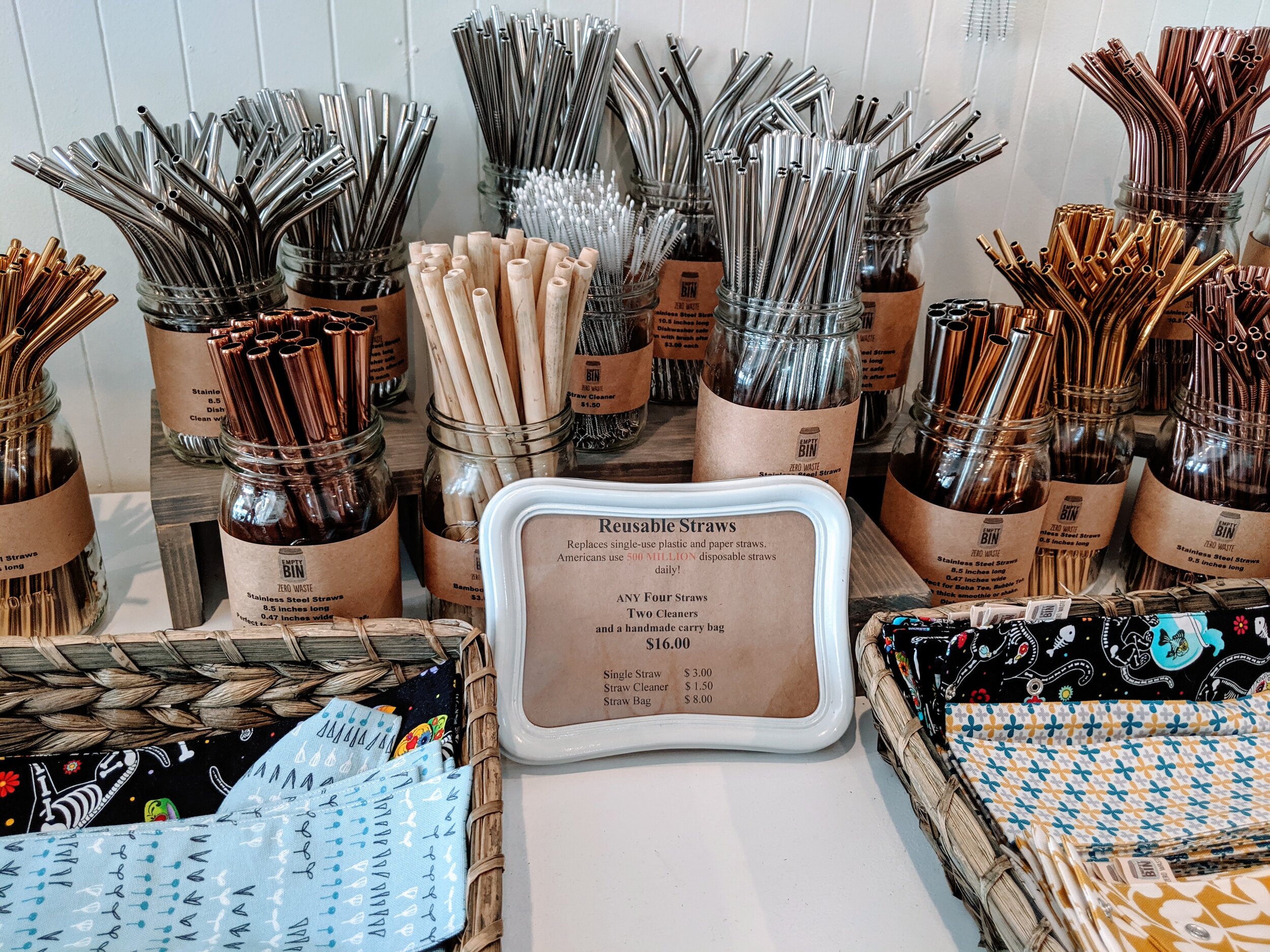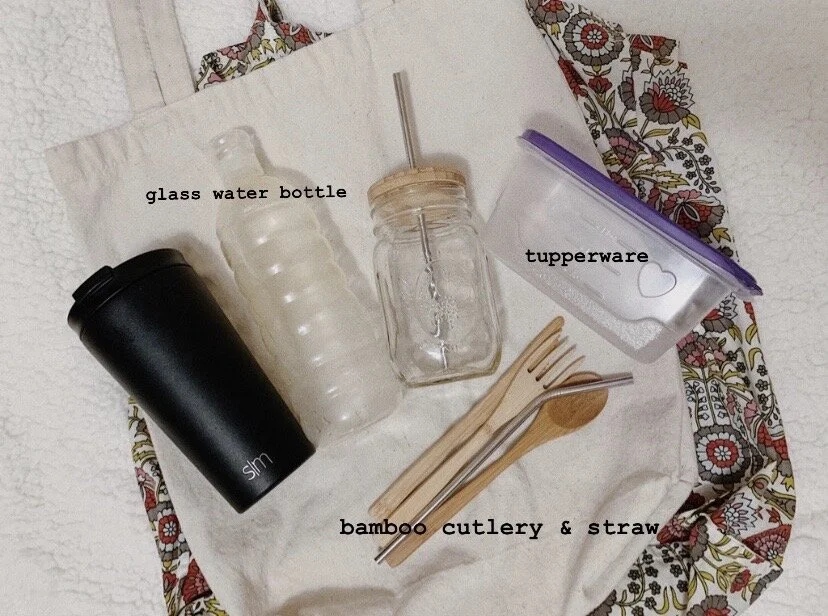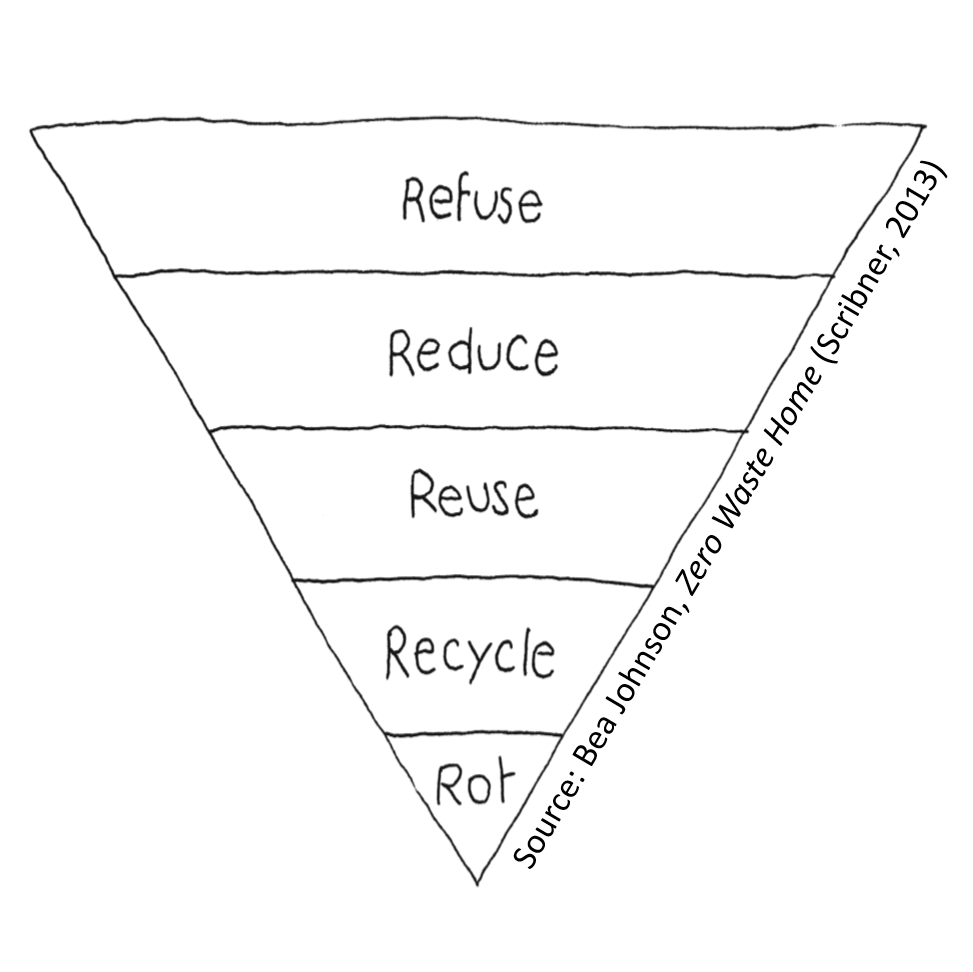A Guide to Living Zero-Waste
Photo of Reusable Straws from Empty Bin Zero Waste, Canton, Ohio
By: Lauren Kleve, Intern
Zero-waste is the concept of producing as little waste as possible in all aspects of your life in order to reduce the amount of trash ending up in our oceans and landfills. According to the EPA, the average American produces about 4.5 pounds of trash each day--if you multiply that number by 365 days, that gives us about 1,650 pounds of trash produced per person over one year. Imagine the amount of waste you would be reducing and helping the planet if you used just a few zero-waste alternatives!
First, I recommend you grab some gloves and sort through your garbage and recycling from the past week. This allows you to directly see the items you consume that become waste and what your main sources of waste are. The goal is to reduce the amount of trash and recycling you produce as much as possible. Given this, zero-waste doesn’t mean to buy all new eco-friendly products and throw out your current ones. You should use the products you already have until they are gone or no longer functional, and then switch to low waste alternatives.
Dedicating your life to zero-waste can seem like a huge commitment, so the goal of this blog post is to educate you on what living zero-waste means and to highlight easy ways to transition into reducing your waste. The zero-waste mission understands that not everyone is able to or wants to live a completely zero-waste life, so the idea is for everyone to implement as many eco-friendly alternatives and decisions, that are plausible for them, into their lives. If everyone consciously made just one zero-waste swap, the amount of trash polluting our Earth would be significantly reduced! Below are categories of potential areas of waste you can reduce and swap with zero-waste alternatives.
Eating & Drinking on the Go
Eating out or grabbing coffee while you’re on the go produces insane amounts of trash that can easily be avoided by being prepared! Keep reusable products with you on the go or in your car at all times to avoid producing plastic and Styrofoam trash.
- Keep a bamboo or stainless-steel cutlery set with you when you leave your house
- Use a reusable water bottle
- Use a reusable thermos or coffee cup
- Use reusable straws: bamboo, stainless steel, silicone
- Bring Tupperware with you when going to eat out to avoid using throw away to-go containers
In the Kitchen
The kitchen is a huge area where plastic waste and other trash is made. There are so many reusable/sustainable alternatives to anything you might need in the kitchen!
- Replace disposable sandwich bags with reusable silicone sandwich bags
- Use reusable grocery bags and produce bags when grocery shopping
- Replace plastic wrap with beeswax wrap
- Use a reusable silicone baking sheet
- Replace sponges with wood brushes or metal pot scrubbers
- Use glass jars for food storage and when shopping in bulk section of grocery store
- Replace paper towels with cloths
In the Bathroom
First, go through all your shower and skin care products and see what you don’t use. You only have one face and one body; they probably don't need 20 different products! Everyone’s skin is different so minimize your products as much as possible but keep what works for you and replace what can be replaced. These are common zero-waste product swaps:
- Shampoo and conditioner bars
- Bamboo toothbrush
- DIY toothpaste or toothpaste tabs
- Compostable/refillable floss
- Apple cider vinegar to spot treat acne
- DIY sugar body scrub for exfoliating
- Coconut oil for moisturizer
- Soap bars instead of body washes and gels
- Reusable stainless-steel razor
- Cotton facial rounds (can be used to wash face or remove makeup)
- Replace tampons and pads with a menstrual cup or washable cotton pads
Cleaning Products
Cleaning product companies have convinced consumers we need a different cleaning product for every situation and that is not true. An all-purpose cleaner will work great for most cleaning jobs! For tougher cleaning, baking soda and distilled white vinegar will clean or unclog practically anything.
- Use a rag to clean and wash it between uses
- DIY your own all-purpose cleaner
- Replace disposable Swiffer dusters with a reusable/washable duster or just use a damp rag
Shopping
Buying second-hand is a great way to save money and reduce the amount of trash in our environment! Basically anything can be bought used, but here are some commonly bought second-hand items:
- Clothes from thrift stores, consignment shops, online stores like thredup.com, or receive hand-me-downs from friends and family
- Furniture from thrift stores, Facebook market, craigslist, etc.
- Electronics from eBay, Best Buy’s geek squad, etc.
- Decorations, picture frames, art from thrift stores, flea markets, Facebook market
- Dinnerware sets, unique cups and glasses, etc. from thrift stores
*bring reusable bags with you whenever shopping or always have one in your car!
Here is a list of stores where you can purchase good quality and sustainable zero-waste products:
- Empty Bin Zero Waste (located in Canton, OH)
Zero-waste isn’t just about using eco-friendly swaps, it’s about making eco-friendly decisions in every aspect of your life! The idea is to follow the 5 R’s in this order: Refuse, Reduce, Reuse, Recycle, and Rot. Refuse what you don’t need. For example, avoid taking free hand outs at events or free samples at grocery stores. Reduce all the possible waste you can through the options mentioned above and through conscious shopping: you can buy things in person when available to avoid extra packaging. For example, at the grocery store you can choose the cucumber without the plastic wrap, etc. Reuse what you can before throwing items away: turn old t-shirts into bags or rags, redesign old clothes, cut up old clothes or sheets and use it to stuff a pillow, use glass pasta sauce jars for food storage, etc. The possibilities are endless! Then, after all those previous steps, recycle what you can out of what is left. Lastly, compost or “rot” all food scraps and materials that you can.
Hopefully, after reading this you will be motivated to make some more eco-friendly decisions in your life to help take care of our planet and reduce the amount of trash ending up in our oceans and landfills! Just by switching from using a store’s plastic bags when shopping to using your own reusable bags, you will save, on average, 500 plastic bags a year from polluting our Earth. Remember, every step counts and every difference matters!






